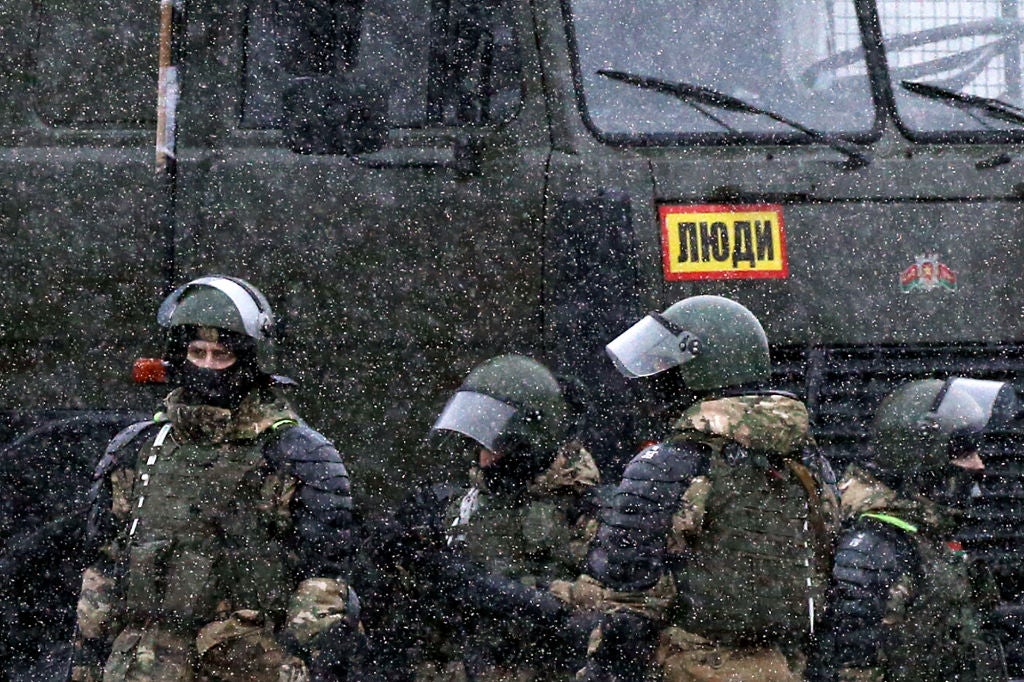Alexander Lukashenko continues a ruthless campaign of violence against journalists – we must not avert our gaze
The political situation in the former Soviet republic remains febrile, but it seems the government knows it can only hold on to power by silencing independent journalists, writes Nadezhda Belakhvostik

In many parts of the world, hi-vis jackets marked “PRESS” offer protection to journalists. In Belarus, they help the authorities identify who to target and who to arrest.
Radio Liberty journalist Vital Tsygankov was beaten while reporting on an anti-Lukashenko protest. He was thrown to the ground, handcuffed and repeatedly punched in the face. Natalia Lubnevskaya, a journalist on the Nasha Niva newspaper, was shot in the leg with a rubber bullet while observing a protest in Minsk. A video of the incident showed she was shot at close range by a policeman.
It is four months since Alexander Lukashenko claimed an overwhelming victory in an election that mobilised popular opposition to his 28 years in power, prompting an uprising that briefly threatened to sweep him from office. The political situation in the former Soviet republic remains febrile, but it seems the government knows it can only hold on to power by silencing the independent journalists who are reporting on the current crisis without fear or favour.
His government is pursuing a ruthless campaign of violence and intimidation against domestic news organisations that continue to challenge the propaganda disseminated by state-controlled media. They face arrest, assault and harassment simply for trying to do their jobs.
Since August, more than 300 domestic journalists have been detained by the authorities, many of them snatched from the streets by police on the pretext of carrying out document checks. Over 60 Belarusian journalists have been subjected to violent attacks by law enforcement agencies in the months since the election. Belarusian journalists have spent a total of more than 630 days in police custody since August.
They are falsely accused of “crimes” including shouting anti-government slogans or coordinating protests. They are convicted in court on the basis of testimony provided by witnesses with fictitious names, their faces often covered with balaclavas to avoid identification. Those witnesses are often law enforcement officers. The intimidation journalists are enduring is unrelenting and frightening. Their families are threatened and many are left with little option but to flee the country.
Ruslan Kulevich, a journalist at the Grodno-based Hrondna.Life, was arrested and detained along with his wife on 11 August. The police repeatedly beat him with batons as he tried to protect his head, breaking both his hands. He was wearing his press jacket throughout the attack. Kulevich was imprisoned for seven days for taking part in an unauthorised protest, and went 48 hours without food. After his release he received treatment for fractured wrists and a serious head injury.
His ordeal did not end there. Belarusian state television reported that his injuries were faked and he subsequently received threatening messages on social media. His home address was shared on a pro-government group on message-sharing app Telegram and his family was also targeted. Ruslan and his wife eventually left the country.
As the brutal crackdown on independent journalists continues, the government has tightened its control over state-owned media. Since August, 300 employees have left their jobs at state television, citing government interference. Their roles have been filled by Russian agitators, reportedly sent at Lukashenko’s request, who specialise in pro-government propaganda. State-owned broadcasters falsely claim demonstrators and opposition parties are financed and controlled by the west. In this context, they argue, Russia is the only ally Belarusians can rely on. It is not subtle, but in the absence of dissenting voices, it can be effective.
The demands of the peaceful protestors who are still taking to the streets are clear and unambiguous and have remained unchanged for months. They are asking for fair elections, the release of political prisoners and an end to violence. The state media does not report those demands, choosing instead to characterise critics of Lukashenko’s regime as traitors who take their orders from hostile governments in the west.
There are now only a handful of foreign journalists working in Belarus because of the dangers of reporting from the country. We are increasingly reliant on domestic journalists who risk their lives every day to report truthfully on events at home.
The eyes of the world were on Belarus in August. We can’t avert our gaze as journalists are brutalised on a daily basis simply for doing their jobs.
Nadezhda Belakhvostik is editor of MediaIQ, which monitors media output in Belarus
Join our commenting forum
Join thought-provoking conversations, follow other Independent readers and see their replies
Comments


Bookmark popover
Removed from bookmarks